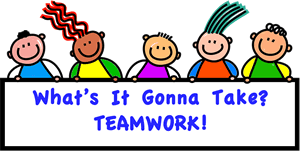Let’s Go Team!
What are some learning opportunities for groups? Take a look at this list and you can probably find at least five activities you could adapt for your students’ age, interests, and standards.
Write a Song, Rap, or Poem
Have students collaborate to write a song, rap, or poem. Encourage groups to practice and then perform for classmates.
• Tie these in with national holidays, seasons, special events, or literature.
• Acrostics work well for this.
Visual Graphics
Have teams use webs, T-Charts, Venn diagrams, and other graphic organizers to explore themes, books, compare/contrast, and so forth.
Brainstorm –
Themes, literature, math concepts and almost anything you are studying can spark brainstorming with a small group.
• Let students brainstorm how to handle common classroom problems like students who break in line. • Brainstorm what to do with broken crayons.
• Brainstorm what to do instead of playing a video game.
• Put big sheets of paper on a wall to use for brainstorming.
KWL – Know, Want to Know, Learned
When introducing a new theme or concept let groups make a list about what they already know about the topic and what they want to learn about the topic. During the study they can be encouraged to write what they are learning.
See What You Can Find Out -
When starting a new unit, select several books from the library on the topic. Give each group a book and ask them what they can find out in five minutes. Let one person from each group report to the class.
• Ask groups to trade books and see what else they can find out.
WWW Research
Assign students a topic to research together on the internet. They can write and report findings to classmates.
Techies
Groups can use technology to take photos, make movies, powerpoints, post blogs, and other projects.
Innovators
Give groups common objects such as a rubber band, safety pin, straw, etc. and challenge them to come up with as many different uses for the object as they can.
Designers
Give groups paper and challenge them to create a paper airplane. Go outside and test airplanes to see which one flies the best.
• They could also design boats or other simple machines.
• In March it would be fun to make a leprechaun trap!
Inventions
Let groups collect recycled materials (cereal boxes, paper towel rolls, etc.)
Can they invent something new?
Dealer’s Choice
Give teams a deck of cards and ask them to create a new game.
Game Makers
Download blank game boards from the internet and let groups make up original games. They will need to decorate the game board, come up with pieces, and write the rules.
• These could be focused around a skill or unit.
Book Talks
Give groups study questions to guide them in talking about books they have read.
• Have them critique books. What did you like? Dislike?
Read and Pass
Teams form a small circle facing each other. One child begins reading and then passes the book to the person on her right. Students continue reading and passing the book around the circle.
• Limit reading to one sentence each, one paragraph, or one page.
Word Games
Give a vocabulary word to each group. How many smaller words can they write using the letters in the vocabulary word?
Phonics
Give teams a letter, word family, prefix, etc. and have them write or draw all the things they can imagine.
Make Lists
Teams can make lists of how to be a buddy, how to be a good student, what to do when they are bored, what they like best about school, and so forth.
Book Makers
Give students and topic and then ask them to make a book about it. Be sure they sign their names as “authors and illustrators.”
• Have an “authors’ party” where groups read their books to classmates.
Take Turns Writing
Give each group a sheet of paper and one pencil. They can take turns writing with the pencil while others share their thoughts.
• This can be adapted for opinion, narratives, or informative writing.
Letter Writing
Write letters as a group to politicians, authors, or other famous people.
• They could also send emails from their group.
Cards and Thank You’s
Teams can work together to create get well cards, thank you notes, and other greetings.
Math
Have teams write all the combinations for a different number.
• Make a list of things that are a 2-D or 3-D shape.
• Look around the room and make a list of all the things that have numbers.
